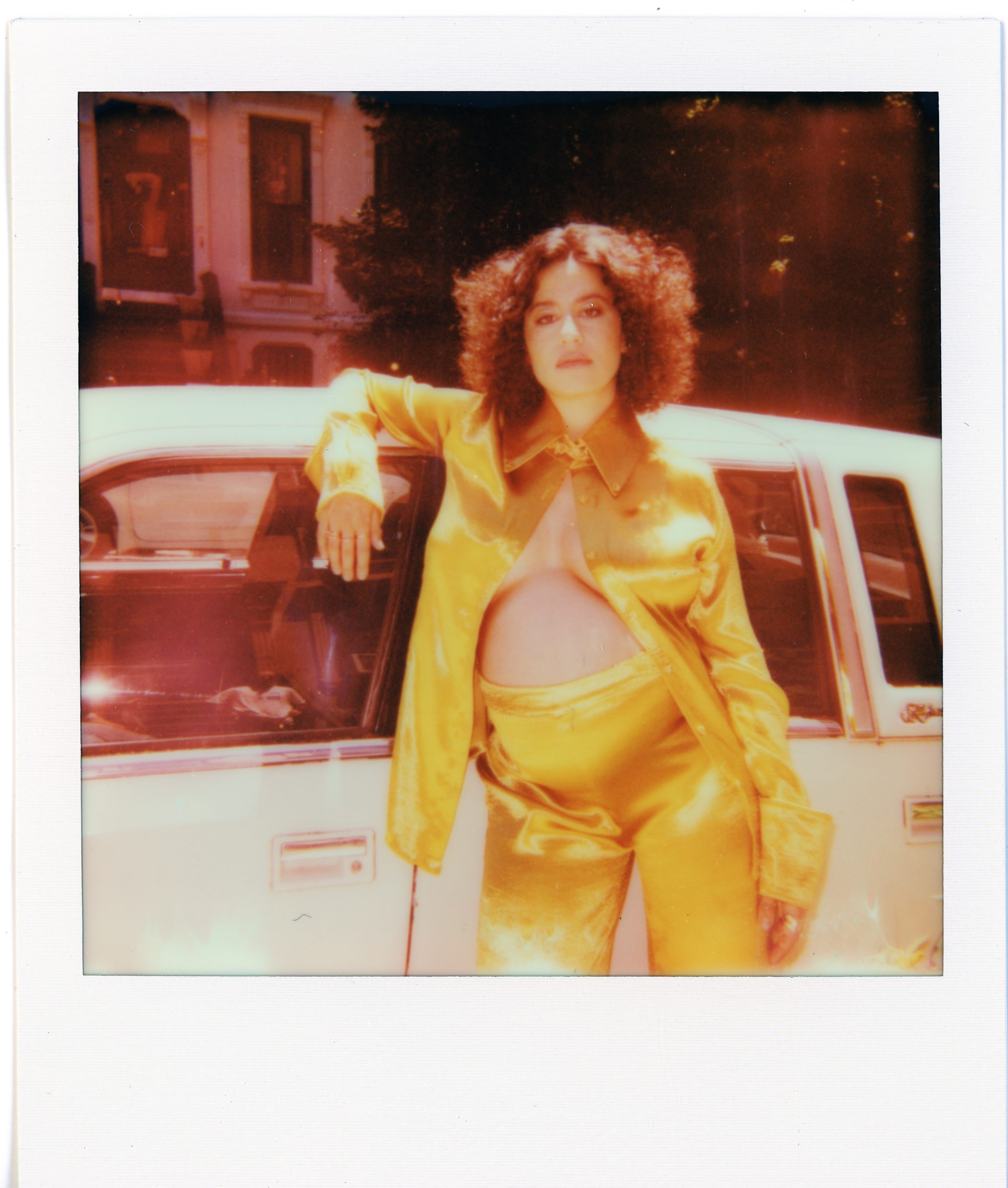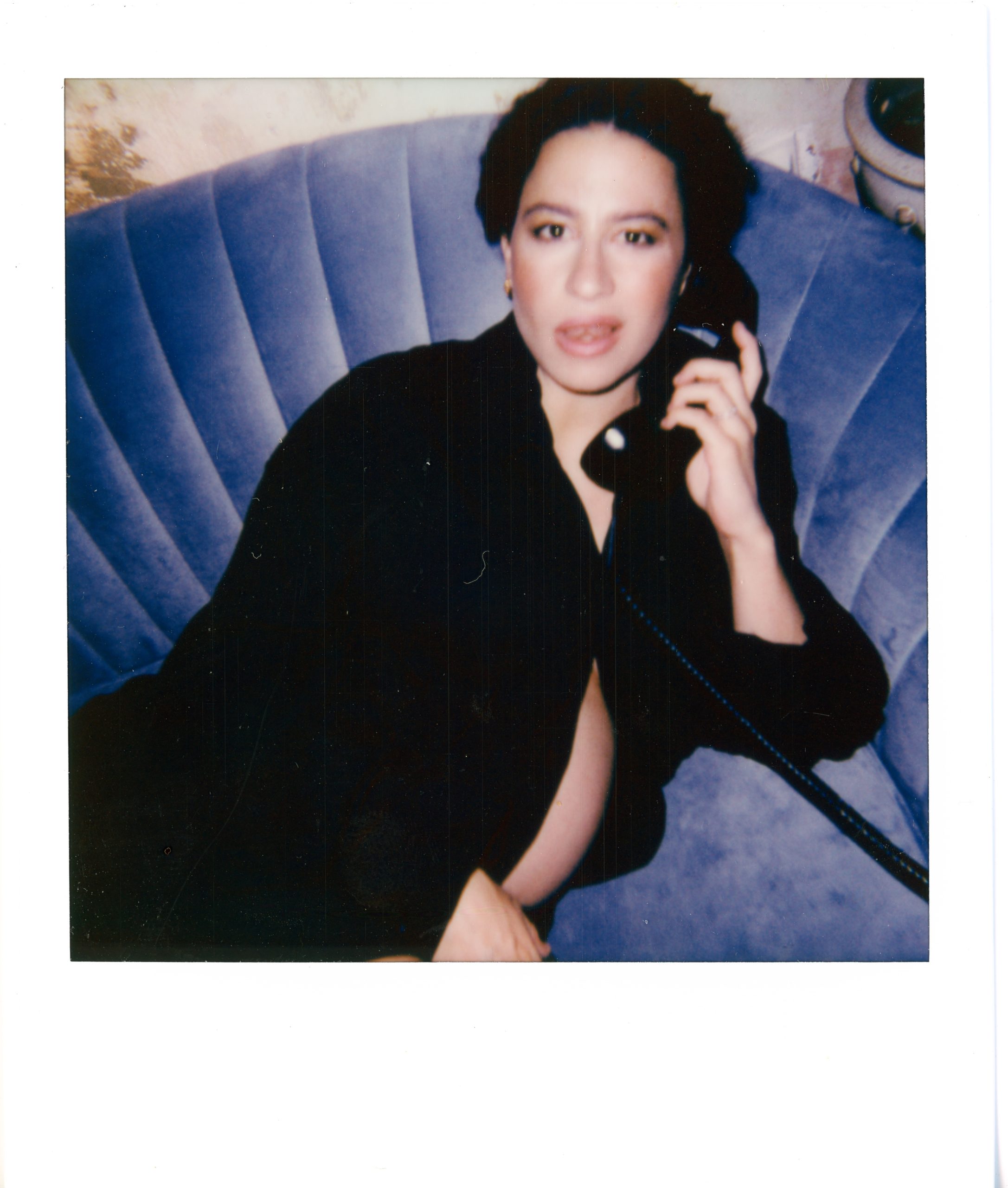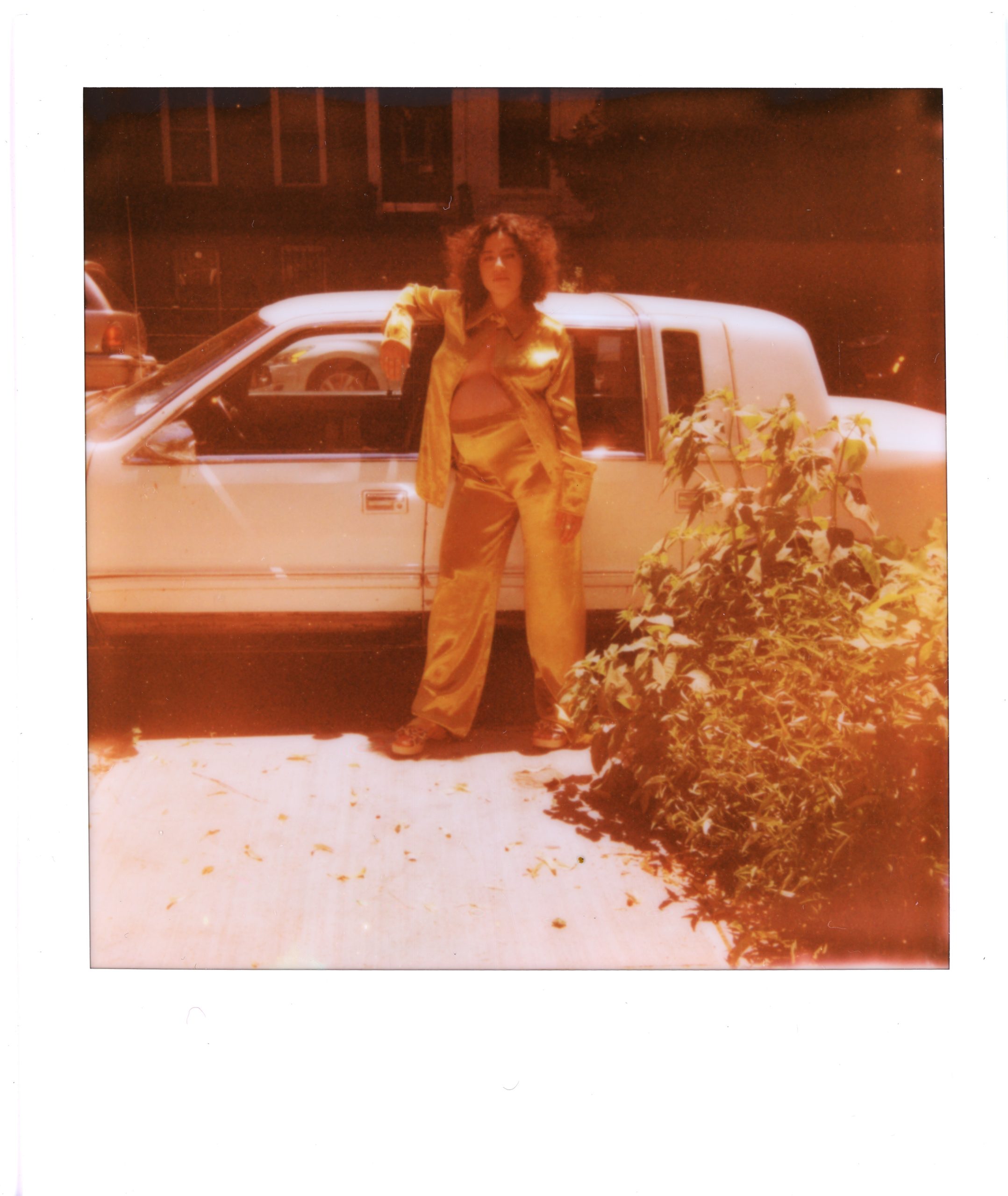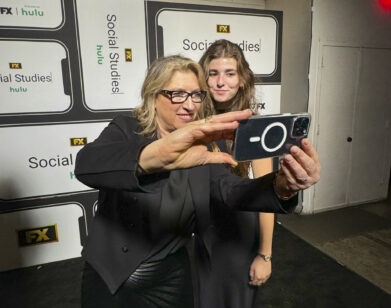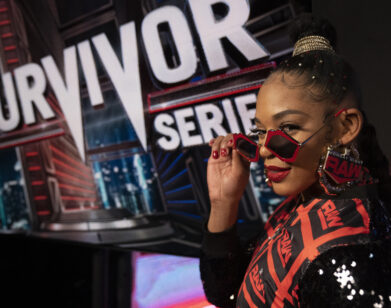IN CONVERSATION
Ilana Glazer and the Lucas Brothers on the Shock of the System

Dress and Shoes by Balenciaga. Earrings by I’mmany London. Bracelets (worn throughout) Ilana’s Own. Rings by Baublebar.
In False Positive, the new film that she co-wrote alongside director John Lee, the writer and actor Ilana Glazer leaves no trace of the character she made famous in Broad City. A horror movie with more on its mind than the requisite scares, False Positive sees Glazer star as Lucy, a woman who along with her husband Adrian (Justin Theroux) seeks the help of a fertility doctor (Pierce Brosnan), after unsuccessfully trying to get pregnant on their own for two years. Lucy immediately becomes pregnant, but the joy is short-lived. To say more would venture into spoiler territory (the movie is now streaming on Hulu) but on top of its mission to freak you out, Glazer and Lee’s script might make you reconsider certain assumptions surrounding race, gender, childbearing, and even reality. Earlier this month, Glazer, who is about to give birth in real life, connected with Keith and Kenny Lucas, the brothers who also recently transitioned from a career in comedy to write last year’s Academy Award-nominated drama Judas and the Black Messiah. Together, they discuss turning tropes on their heads, unlearning what society teaches as facts, and why it should be uncomfortable for white people to dismantle the system that surrounds them.
———
KEITH LUCAS: The movie was spectacular. What inspired the idea, and what was the process in terms of going from idea to script, to finally shooting it?
ILANA GLAZER: John Lee is my co-writer and director for False Positive and he made the cult hit Wonder Showzern with Vernon Chatman, Alyson Levy, and Jim [Tozzi]. John directed a bunch of Broad City episodes, and he and I found in our growing friendship, our values to be overlapping. Not only in what makes a joke, but also in how crew is the same as talent. Their time is worth what the talent’s time is, and how a set can be a political space. It was an intense thing to connect over. I was always asking, “What else are you working on?” when we would hang out. He had written this short film with Alissa Nutting, this weird, amorphous, mood-driven, story about a woman having a miscarriage. It was in the area of where False Positive is, but it was just a completely different thing. But the area was so cool. The area that it covered was loss during pregnancy. I found that to be interesting, because the narrative that we’re given is that it’s a gain, and if you acknowledge the loss, you’re depressed.
KEITH: Right.
GLAZER: I kind of kept sniffing around every few months. “You doing anything with that? What are you doing with that? What’s up with that?” Finally, after two years of just sort of gently checking in, I was like, “I’m just going to propose that we take this nugget, and turn it into a feature.” I wanted to have the experience. I had written one other feature, a comedy script with Abbi that didn’t land anywhere, but I really wanted to have the experience of writing a feature. John was in, and it became a totally different thing. I liked pushing forward, in a way where you don’t know, as a writer, what’s going to happen.
KENNY LUCAS: You did such an amazing job of, I wouldn’t call it misdirection, but you have these classic beats, and if you invert each and every one of them, you never know where you’re going. It’s a twist beyond a twist, which I think is effective in both comedy and horror.
GLAZER: I find whether it’s comedy or horror, the unexpected that exists in the system that we live in to be the most shocking and fascinating. Especially because it’s in plain sight. The way that you uncover the system, and what is there to do? Scream about it? Yeah. Protest about it? Okay. Even make policy about it, awesome, but still it’s stranger than fiction. It’s unbelievable.
KEITH: The character Lucy, you connect with her almost immediately. Her struggle is so daunting and so relatable, but also put into an elite world that’s not really available to your average person. Can you describe what kind of woman you wanted Lucy to be and how you wanted her to be portrayed?
GLAZER: I forget that there were specific people in mind when I was writing her with John. Coming from comedy, you’ve spent all these years finding your voice as you. You are the vessel.
KEITH: Right.
GLAZER: There could have been other ways to play it, where it was more like me, but I thought it would be extra eerie to really see this other person. Something that shocks me again about the system is how I thought New York was so progressive because of the way it’s branded itself.
KEITH: Yeah.
GLAZER: And, the fact that Donald Trump not only was born in New York and lived in New York for years and years, he terrorized people of color in New York, the whole time.
KENNY: That’s right.
GLAZER: Then he became president. We didn’t stop him. This city could have stopped him.
KENNY: Right.
GLAZER: I like that narrative of the liberal elite. I hate the way Fox News makes it as though they’re not liberal elite. They’re based in New York City. They’re super-rich. Tucker Carlson is a multi-millionaire. The wealth gap here shows how backward our city is. But, that’s not who I’m focusing on. There’s a wealth gap here, period.
KEITH: Yeah.
GLAZER: John and I were excited about, as people who consider ourselves progressives, interrogating our own lives, interrogating people that we know and work with. We know people like Lucy and Adrian. And we know and we have worked with people like Lucy and Adrian. It’s like, “This is totally fucked. This is not progressivism.” It’s all-optical, their liberal thinking. What I liked about writing Lucy and playing her is that she is the type of white New Yorker and white woman who thinks she is safe, within her own body, and safe for others. And probably skates that line of thinking she’s sympathizing and empathizing with marginalized voices, but not going deep enough to really sit with where she is. She is in denial for so long that when the one little Jenga block is removed, the whole thing falls apart.
KENNY: The story is operating on two levels, right? You have the external story, where she’s dealing with her pregnancy. Then there’s this internal story, where she’s conflicted about her place in white society. That’s what really blew me away. Her struggle with being a white woman in this really pernicious system, and just coming to grips with that. That’s just so beautifully laid out.
KEITH: I thought it was really clever what you guys did, with the Magical Negro trope. When she was first introduced, I was like, “Uh-oh. What’s happening here?” You guys, again, figured out a way to invert it and comment on how white society sort of leans on African-Americans. Particularly African-American women, as sort of these spiritual gurus, but the reality of the situation is that you got to handle it yourself.
KENNY: What sort of commentary were you trying to say with the film about society? About white feminism and its relationship to the patriarchy and to African-Americans?
GLAZER: The first thing is, the birthing system in this country is rooted in the enslavement of African people, African-American people. Where it has gotten now is the commodification of the experience of birth and the repetition of white supremacy, colonizing this human experience. It’s absurd and it’s insidious. And it’s also comical. John and I really saw the horror and comedy as two sides of the same coin and wanted to comment on it. I’m really about looking at how we are a part of it, how we contribute to it. That was also such a delicate thing to play, and something that we had to fight for, that some of our collaborators were very scared to do. That moment of when you first meet Zainab Jah’s character, Grace Singleton, to when we understand as an audience, that what is going on is uncomfortable.
KENNY: Yes, right.
GLAZER: This level of interrogation is uncomfortable, and should be uncomfortable. I’m really proud of the way we unfolded that realization. This is how I want to use my white womanhood in my art for the foreseeable future. To bring the audience with Lucy in such a way that they check their own ignorance and blinders, but also give the audience a little space to judge, because that feels good to be distant from this ignorance. If it feels good, keep going with that. Keep assessing yourself from that with education and awareness. The thing about white feminism and white supremacy is that, if you don’t hold that intersection with race, you, the white person are losing out. I’m continually miffed at my own ignorance. The system promised me some false narrative and that’s the thing about the patriarchy, men lose. White men lose. In white feminism, there’s a huge chunk missing if the white feminist is not holding the intersection of race. Lucy has this sort of broad cultural headline sense of awareness, but she’s very distant from herself in the beginning of the film. Walking with her through this journey, I think we show how scary gaining self-awareness can be. It is scary, because the system is selling lies.
KENNY: Right. The system is selling lies. A lot of us buy into it and it does play a role in keeping us back. I think you do a great job in situating Lucy into a very complex world. I’m not a part of influential society, especially white society. And that’s a very specific kind of world. I wonder, is there some incentive for white progressives to portray this sort of false progressivism, to protect their class status? Is there a connection there?
GLAZER: Yeah, absolutely. I think there’s this falsehood that the white mainstream thought “if we pay reparations, we’re going to lose out.” So while on one hand, there’s a false sense of white people losing out, whether monetarily or even just verbally, in truth, acknowledge how much has been stolen from Black people to build this country. Why shouldn’t white people give some shit up? It’s also different than being stolen from. And I think that white progressives often try to take a line, where they don’t have to give up too much, but get the credit for being woke.
KENNY: Yep.
GLAZER: There’s a falseness in that where I’m like, “No, you got to give something up. Even if it’s your identity as not a racist. If you’re white and you’re in the white supremacist system, like I am, then I am racist. I’ve benefited from being white most of my life.
KENNY: Right, right.
GLAZER: It’s so interesting how sometimes Jewish people are used as some way to break the binary, that feels trapping to so many people. Especially people of color, but we’re all trapped in this. They’ll be like, “But dude, the Jewish people.” And it’s like, in this country, we were not enslaved. And my skin is white, and I may be perceived as ethnically ambiguous, but to cops, I’m a Caucasian person. There has to be something given up, in order to dismantle this system.
KEITH: I think you’re right. I think that folks have to be willing to make a sacrifice to bring about a more equitable society. When it comes to this false progressivism, how do you feel the character Lucy relates to it? Do you believe that she’s entrenched in false progressivism? And do you think her actions, throughout the course of the film, bring her closer to either breaking the system or breaking herself out of it? Or is it a no- exit situation, where she recognizes that it’s meaningless to try and break up the system?
GLAZER: I feel like Lucy isn’t holding race very much at all. That’s why the Grace Singleton piece is such a shock and such a twist. I think she’s only capable of holding one claim of identity, which is gender. And I think she holds it at a distance, and hopes that she’s as equitable in her marriage with her male partner and at work with her male colleagues. She hopes that she’s as equitable as she desires, and closes her eyes and stuffs her ears. Do her actions break the system? I personally feel it’s like it’s a no-exit situation.
KEITH: What type of conversations do you want this film to start? And what do you think people are going to feel, leaving the film?
GLAZER: It’s hard for me to describe the feeling that I want people to have, because I’m pretty sure it’s going to be a disturbed feeling. Which I’m not thrilled about, but I can definitely get into the heady shit where I really want white people who see this film to interrogate their whiteness, and I want them to feel held in their discomfort so that they can continue interrogating themselves, internally and externally. For anyone who sees this film, of any identity, I really hope for them to be able to tease out the societal experience from the human experience and remember that the societal experience is one design that randomly took off. Randomly, I mean, by force and violence. It could have been another way, and it wasn’t that way. We are getting to a place in our world, because we are so connected with communication, which can be so ugly at times. The way the algorithm, like on these huge digital platforms, tends to veer into a white supremacist lens. Yet, the human connection beyond it democratizes itself, and we’re reaching this fever pitch, where the system we live in isn’t working. I hope our audience gets a feeling that shit is random, and humanity is a way bigger umbrella. The human experience is more powerful than the random societal design of the system that we live in.
———
Hair Stylist: Matthew Monzon
Makeup Artist: Delina Medhin
Special Thanks: Polaroid

